Are you on the hunt for a new sewing machine? If you haven’t heard of the Juki brand, you’re in for a treat. This highly acclaimed sewing machine company makes machines for whichever type of sewing you want to do.
I’ve collected information about 11 amazing Juki sewing machines. I’ll fill you in everything you need to know about these 11 great Juki sewing machines. You will also learn a bit about why Juki is the machine of choice for so many people.
Table of Contents
Best Juki Sewing Machines – Comparison Chart
Start by taking a quick look at this chart to give you a quick look at the differences among 11 Juki sewing machines. But don’t stop with this chart. Be sure to read the review and research of Juki sewing machines too!
Top 11 Juki Sewing Machines to Buy Pros and Cons
You’ve had a quick look at the comparison between Juki sewing machines. But now it’s time for you to really get to know the top 11 Juki sewing machines. You’ll find details, advantages, and disadvantages below.
1. Juki HZL-DX7 Series Sewing Machine
(Editor’s Choice)
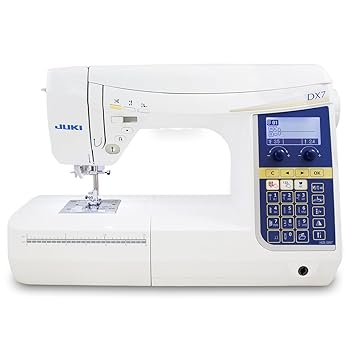
I’ve placed this one at the top of the list for a reason. Actually, there are a few reasons why my first choice is the Juki HZL-DX7. Not only does it have 287 built-in stitches, but it can also sew through thick and layered projects. I never have a problem sewing my denim with this Juki sewing machine.
You might be wondering about how fast this sewing machine is. Well, just because it is tough and can handle thick fabrics doesn’t mean it is slow. This Juki sewing machine can sew at a whopping 1050 stitches per minute! It’s perfect for the impatient sewing enthusiast.
The Juki HZL-DX7 is a computerized sewing machine. I prefer computerized sewing machines to mechanical. I find the digital screen helpful and the stitch functions easier to navigate on a computerized sewing machine.
Of course, this incredible machine comes with a price tag. But I have found it worth every penny!
Pros
- Durable
- Quiet operating noise level
- Comes with many accessories
Cons
- Price
- Occasional bobbin filling issues
2. Juki TL-2000Qi Sewing and Quilting Machine
(Best Sewing Machine for Quilting)
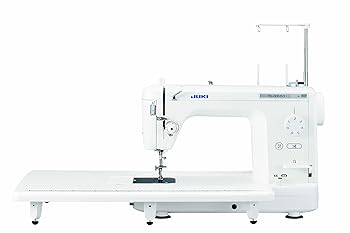
Although this Juki one is number two on my list, it is a favorite among quilters.
The Juki TL-2000Qi only has one stitching option. You can do forward and reverse straight stitching. But that should be enough when sewing a beautiful quilt.
It is an incredibly strong machine for the price. I like how it is a nice balance between an industrial machine and a home sewing machine. I get the durability and strength without going all out for an industrial machine.
Did I mention it’s fast? It sews at 1,500 stitches per minute. That speed along with the super convenient needle up and down controls are a quilter’s dream. You’ll have your heirloom quilts finished in no time at all!
Of course, there are some drawbacks. If you are a beginner at sewing, you might want to start with a different machine. This Juki takes a bit of time to get used to. But if you’re still set on buying this Juki and are ready to invest the learning time, you still won’t be sorry!
Pros
- Versatile
- Fast stitching
- Removable extension table included
Cons
- Less user friendly
- Some find the automatic needle threader difficult to use
3. JUKI DDL-8700-Servo Industrial Straight Stitch Sewing Machine
(Best Sewing Machine for Home Business)

Don’t let the name fool you. Just because this Juki is industrial, doesn’t mean it can’t handle a gentle fabric as well. It’s very versatile with medium to heavy fabrics. And because it’s industrial, you can sew as much as you want before it needs a rest.
It is a rather large sewing machine, so it might not be worth it to you if you only sew once in a while. It will be perfect if you have a small home sewing business and have a bit of extra space for it.
As you sew through all of your job orders or projects, you won’t be waiting around for the Juki DDL-8700. It is one of the fastest sewing machines, sewing at 5,500 stitches per minute!
Pros
- Very fast
- Can handle huge workloads
- Quiet Servo motor
- Versatile
Cons
- Takes up a lot of space
- Only straight stitching option
4. Juki HZL-F600 Computerized Sewing and Quilting Machine
(Best Sewing Machine for Advanced Sewing)

Now we come back to another computerized sewing machine. You already know Juki computerized sewing machines are my favorite! I love all the built-in designs to help me make any sewing project a little extra special.
It’s not as fast as other Juki sewing machines, but it might just be perfect for smaller more unique projects. My favorite project to use this Juki for is monogramming. It has four different fonts if you want to add a special touch to any of your clothing.
But don’t stop with clothing. The extra large work area allows you to snazz up bigger projects too! Add your designs and initials to towels, curtains, or blankets!
Pros
- Sophisticated design options
- Large working area
- Foot controlled thread cutter
Cons
- Not for beginners
- A bit pricey
5. Juki HZL-LB5100 Computerized Sewing Machine
(Best Sewing Machine for Beginners)

Are you a beginner to sewing? You may not want to spend a lot on your first machine. But what if you also want a machine that lasts? You probably don’t want a machine you have to throw out after a year. It would also be nice if you didn’t have to buy a more advanced machine once you start becoming an expert at sewing.
Well, Juki TL-2010Q is here to help with everything! It is much more reasonably priced than the more some other Juki machines, but with little sacrificed in the way of sophistication and options.
It is still computerized and has all of those lovely built-in stitches. This is great for beginners. You can add life to any of your fabrics without pulling your hair out.
It isn’t quite as fast as some other Juki sewing machines. But, as a beginner, you probably don’t need lightning-fast stitching. Long story short: If you want a quality sewing machine on a budget, this Juki is the one!
Pros
- Bright work area
- Easy to use
- Affordable
Cons
- Slower stitching speed
- Louder motor noise
6. JUKI MO654DE Portable Thread Serger Sewing Machine
(Best Sewing Machine for Clothing)

If you are sewing sleeves and pant legs, you have probably been wishing for a serger. The Juki MO654DE Portable Thread Serger is a great sewing machine to start with. It offers super convenient built in hemming. It’s perfect for no-fuss sewing of clothing from start to finish.
After reading about some giant sewing machines, the word portable is probably very tempting as well! It is lightweight, but still gets all the jobs done. I love the snap on presser feet too!
Though this machine doesn’t offer a goodie bag of stitching options, you can still choose from the basic stitching options to best suit your hems and collars.
Even though it is portable, you’ll be glad to hear that it can still handle heavier fabrics. So if you’re looking for a serger that can do it all without taking up an entire room, this Juki is your best bet.
Pros
- Portable
- Simple hem creation
- Affordable
- Quiet
Cons
- Some reported issues with tension consistency
- Thread easily tangled due to exposure
7. Juki HZL-LB5020 Computerized Sewing Machine
(Best Value Sewing Machine)
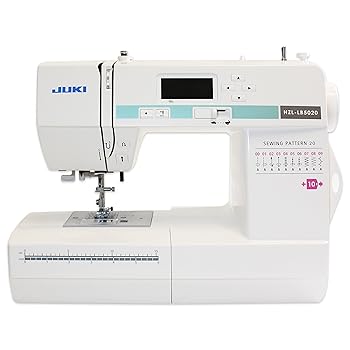
If you are a beginner on a budget, you’ll want to check this Juki out. Even if you are more advanced at sewing and looking to buy a replacement machine, this might be the one.
The Juki HZL-LB5020 offers a nice balance of durability, options, sophistication, and it’s affordable! That’s why I have ranked it the best value sewing machine of this review.
This computerized sewing machine offers an LCD screen and the ability to program all the functions you need. You’ll be able to quilt, sew seams, and design on almost any fabric you like.
It’s not quite as fast as other sewing machines, but it’s perfect for any home sewing activities you have in mind. If you’re looking to start a business, you may opt for a more industrial Juki sewing machine. But if you’re happy sewing from home and aren’t as impatient as I am, you’ll love this Juki sewing machine for its range and simplicity.
Pros
- 1-step buttonhole function
- Easy to use
- Simple bobbin replacement
Cons
- Occasional difficulty with threading
- Slower stitching
8. Juki TL-2010Q Lockstitch Sewing Machine with 1-Needle
(Most Durable Sewing Machine)
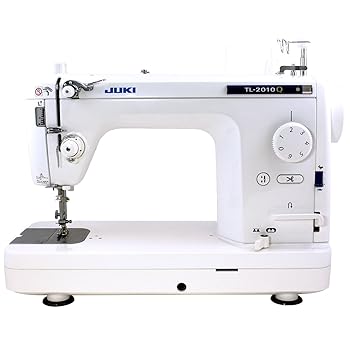
This Juki sewing machine has a super sturdy, heavier design. This will allow you to sew very precise patterns without mistakes. There will be less vibration movement, so you will have top accuracy with this sewing machine.
The Juki HZL-F300 is another favorite among quilters and people sewing big fabrics. It has a large workspace lit up beautifully with LED lights. You’ll be able to stitch exactly as you intend with no surprises due to the excellent speed control.
Although there aren’t multiple stitching capabilities, it will do your straight stitch jobs with ease.
Pros
- Well-lit work space
- Durable and stable
- Automatic thread trimmer
Cons
- Occasional automatic needle threading issues reported
- More expensive
9. Juki HZL-F300 Sewing and Quilting Machine
(Best Sewing Machine For Buttons)

Buttons may be small, but they can bring on a big headache if you don’t have the right sewing machine. This Juki has 16 automatic buttonhole options. They utilize electronic automatic sensors to make the perfect buttonhole for your shirts, jackets, and pants.
The Juki HZL-F300 is a mid-priced machine, compared to other Juki sewing machines. This makes it perfect for those of you sewing from home but maybe looking to start a home business. You can try out your craft on this affordable Juki sewing machine.
If you’re working from home, this machine won’t keep the rest of the house up at night. It emits very little noise compared to other machines of comparable strength.
Pros
- Well-lit workspace
- Large working area
- Multiple automatic buttonhole options
- Quiet working volume
Cons
- Occasional bobbin issues
- No knee lift
10. Juki Exceed F600 Quilt & Pro Special
(Most Versatile Sewing Machine)

If you love making buttonholes, this Juki has just as many options as the Juki HZL-F33. But it comes with so much more (including a higher price tag).
The Juki Exceed F600 is truly for quilters, and pros–and anyone else, really! It has enough extra perks to keep you sewing, hassle free for days on end.
It’s got 225 sewing patterns built-in. You’ll never run out of things to do. In addition to the built-in patterns, it also has four fonts to work into your monogramming projects. And that’s not all! It also has 10, yes 10, presser feet options.
You might be wondering how you will coordinate all these fancy features. Well, the generously sized LCD screen helps you make all your design and monogramming adjustments without straining your eyes.
You’ll love the extra large working area for your quilts and curtains. And I think you’ll agree that the foot controller with a thread trimming capabilities is a new luxury many of us need in our sewing lives.
Sure it costs more. But if you are progressing past being a beginner at sewing, and you love sewing fabrics from silk to extra thick. And if you’re into speed and strength…this Juki will not disappoint!
Pros
- Box feed technology for accurate sewing
- Strong and durable
- Knee-lifting lever
- Fast
Cons
- Some have trouble threading
- Beginners may need extra assistance getting started
11. Juki MCS-1500 Cover Stitch and Chain Stitch Machine
(Best Cross Stitch Sewing Machine)

It’s not just the price that makes this Juki top of the line. This cover stitch machine offers amazing extras for anyone who loves sewing.
Though the features are appealing to all, the Juki MCS-1500 might be best suited for the more advanced. It would be an ideal sewing machine for someone with a small business. You won’t be wasting time with many arduous tasks, as this Juki has designed features to save you time at every turn.
Sewing clothing can be complicated, especially when considering hems and collars. This Juki has you covered. It has three needles. So you will be able to do a three thread cover stitch or a four thread chain stitch. The three thread stitching will master your necklines and sleeves, while the chain stitch will ensure your pants and side seams are perfect.
I voted it the best cross stitch machine, but was tempted to crown it the best for sewing stretchy fabrics, too! The machine’s flexibility, adjustable presser foot pressure, and multiple needles turns sewing stretchy fabrics from a nightmare to a dream!
Pros
- Useful built-in guides.
- Extension plate
- Exterior thread cutter
Cons
- Some find threading complicated
- Better for specialized sewing
Who Makes Juki Sewing Machines?
Now that you’ve read about eleven amazing Juki sewing machines. I imagine you are ready to go out and get your own. But some people might need a little more information to feel comfortable about this sewing investment.
You might first be asking who makes Juki sewing machines. The Juki Corporation is responsible for these magical machines. The company took its first steps in 1938 and has been running ever since.
There have been a few minor name changes and partner/parent company shifts. But, by and large, they’ve been focused on making high-quality industrial and home sewing machines for 80 years! I’d say that’s enough time to perfect a product.
Juki is a leading global sewing machine brand and prides itself on quality, durability, and reliability.
Where are Juki Sewing Machines Made?
The Juki Corporation headquarters is in Tokyo, Japan. But many people want to know where their sewing machine is manufactured.
Juki manufactures its sewing machines in Japan, Vietnam, and China. Their distributors may be in various other countries. Their sophisticated logistical framework ensures quality, no matter which manufacturing outlet the machine comes from. That’s how they’ve stayed number 1 in sewing machine manufacturing.
What is a Juki Sewing Machine?
Well, by reading the reviews above, you can see that Juki sewing machines can be anything you want them to be! Over the years they have managed to create their high quality sewing machines for both home and industrial use.
More importantly, they have listened to their customers. Each new machine comes with specifications meant to make your life easier when sewing. And each new machine has a specific level and type of sewing enthusiast in mind. That’s why it is so important to read up on each machine. Chances are, there is one perfect for you!
But Juki sewing machines are so much more than great running machines. Part of the “Juki Code of Conduct’ from their corporate code of conduct, focuses on safety of workers and consumers, and also considers the environmental impacts of manufacturing.
So, in short, a Juki sewing machine is versatile, durable, strong, and sophisticated; and they get all of these positive qualities from a very special and dedicated corporation.
What is the Price of Juki Sewing Machine?
Juki sewing machines range in their number special features, speed, and specialties. Their price tags also have a large range. Single home and home industrial machines can range from a couple hundred dollars to more than a thousand.
As you learned from the reviews above, you can pay more for computerized machines with a lot of functions. But mechanical machines can also be spendy if they are the ultimate sewing workhorses, able to tackle thick fabrics, quickly, and for long periods.
You can always choose to purchase a used Juki sewing machine, but ten you sacrifice the warranty and risk problems arising later that the first buyer caused.
Though if you do your research, you can find a machine with the right price tag for your needs.
Are Juki Sewing Machines Good?
Maybe you are a bit of a sceptic. Maybe these machines seem too good to be true.
I assure you, Juki sewing machines are not just good–they’re great. If you don’t believe me, ask another sewing professional. You can read thousands of positive reviews on Amazon and other purchasing sites.
Sure, no machine is perfect. There are always a few negative reviews. But, if you read closely, most of these reviews stem from user error. If you buy a sophisticated Juki sewing machine, you need to learn how it works before you jump right in and tangle strings up. You’ll learn a bit later how to take care of your Juki sewing machine.
I personally think they are great because of their perfect combination of industrial and home sewing capabilities. They do this without compromising on quality and durability. I love how I feel like a sewing master on their machines.
Juki is a long trusted brand by people in over 170 countries. I’d conclude that, yes, Juki sewing machines are very good!
Why Buy a Juki Sewing Machine?
You have probably read this review because you are on the market for a new sewing machine. Maybe you are just looking for an upgrade. Even if you are merely curious about Juki, there are many reasons to buy a Juki Sewing Machine.
You have a home sewing business
As you read in the reviews above, Juki sewing machines give you everything you need to start or continue your home sewing business.
Their strong and durable nature lets you work through all of your orders without hiccups. Some of the machines are geared to handle thick and large fabrics without awkwardness or inconsistencies.
Most Juki sewing machines are faster than the average sewing machine. You won’t keep your customers waiting on account of a slow stitching machine.
You love making and fixing clothing
Many Juki sewing machines help you make seams and hems with no fuss. This will feel like an essential if you like to make your own shirts, pants, and dresses.
Juki sewing machines are also notorious for handling a range of fabric types. So whether you are sewing silk, cotton, or denim you can feel confident your Juki sewing machine can do the job. They are even famous for handling stretchy fabrics too. If you’re like me, you know that stretchy fabrics can be a nightmare on other machines.
You are an enthusiastic beginner
So maybe you aren’t a professional. And maybe you don’t have a home sewing business. Perhaps you haven’t ever even sewed before. Should you still buy a Juki sewing machine? Are you a bit afraid that they are only reserved for the advance sewing person?
You will be relieved to know that Juki offers great value sewing machines that can support you as a beginner all the way up to being a professional. If you are a motivated and eager learner and don’t want to have to buy a new machine once you develop your skills, a Juki is right for you. It will be with you from your first clumsy all the way to your perfectly crafted summer dress.
What Do Juki Sewing Machines Do Best?
I hesitate to even write about anything that a Juki sewing machine does best. As you read earlier, one of the greatest things about Juki sewing machines that they are versatile in both their customer and capabilities.
But if you must know. I am tempted to say they are best at quilting, due to their precise stitching and perfectly designed, ample work area. But I can’t limit their number one quality to quilts. Especially, because I know how much I love Juki sewing machines for their features and versatile fabric abilities.
I have also heard of tailors that couldn’t live without their Juki sewing machine. They can’t imagine making a hem or an alteration on any other machine.
But then again… There are thousands of eager amateur seamstresses that rave about their Juki, even if they aren’t sewing to sell.
Are you beginning to feel like I won’t give you an answer? I will. Juki sewing machines do quality best. Their quality parts and quality design create quality products–no matter what your project is.
Are Juki Sewing Machines Better than other Brands?
Are you a bit competitive? I am too. That’s why when I first thought of purchasing a Juki sewing machine, I had to see how they stacked up against other sewing machine brands. Here is a quick look at how they compare to other popular sewing machine brands.
Juki vs. Janome
Many people have used a Janome sewing machine. If you have used both a Janome and a Juki sewing machine you might have the same opinions as I do.
I find Janome sewing machines a bit clunky. If you have read closely so far, you remember that I love my Juki sewing machine because it is quiet, smooth, and accurate. Juki Corporation strives for an enjoyable user experience. So they have all types of customers in mind when building and designing their machines. I am already an awkward person, I don’t need my sewing machine to be awkward too!
Quilters will agree with me. The straight stitch function is much more precise on a Juki sewing machine. As most quilts are either for sentimental or expensive selling, you’ll want a precise and trusted stitch when working on your special project.
Juki vs. Singer
Singer is a long-standing brand among many seamstresses. It has been in the business a long time. They’ve been providing high-quality machines for over 160 years after all! While I used to be partial to Singer sewing machines, I still think Juki is worth a look!
My biggest complaints with Singer are admittedly not huge, but it’s enough to prefer my Juki sewing machine.
Many Singer sewing machines lack an automatic thread cutter. I am a bit lazy and love new gadgets. So I love how Juki has incorporated this function in many of their machines.
I also like that Juki, by default, can usually handle heavier fabrics than a Singer. Of course there are exceptions, but by and large, I am confident my Juki can handle layers upon layers, while I am sometimes a bit worried about how my Singer will hold up on my thicker fabric projects.
Juki vs. Brother
Brother is another sewing company that has been around for a while. They have been serving the sewing world for over a hundred years. But no matter how long a company has been around, I still focus on the final product when making a purchasing choice.
I find Brother sewing machines very useful for beginners. And if this is where you’re at you might lean towards a Brother sewing machine over a Juki, especially if you are considering your bank account.
That said, I still think even beginners will miss some of the convenient features that a Juki offers over a Brother sewing machine. Again, Juki usually offers automatic thread cutting. Many Brother sewing machines won’t have this.
I love how Juki can be great for beginners all the way to advanced seamstresses. You can still find a mid-range priced Juki sewing machine that gives you all the support that a beginner needs, while also offering more advanced options once you get better.
So, in conclusion, I think Juki is better suited to be versatile for beginners all the way up to the more experienced sewing enthusiast.
Is My Juki Sewing Machine a Fake?
Nobody wants to get ripped off. I always want to get what I pay for. If you have decided on a Juki sewing machine, you don’t want a cheap knock off pretending to be a high quality Juki.
Unfortunately there are a number of crooks that would like to jump on the back of this fine corporation. They sell sewing machines and pretend they are Juki. People know and love Juki sewing machines and are willing to pay more. So the brand name will earn the criminal more money. Here are a few tips for making sure your machine is a real Juki sewing machine:
- Look in the oil pan. There should be a Juki logo engraved.
- Check that the instruction manual and accessories appear the same as on an official Juki dealer’s website.
- You can even submit a photo of your Juki sewing machine to trusted distributors for a final check.
Juki Machine Dealers
I hope you’re not too scared about accidentally purchasing a fake Juki sewing machine. Don’t worry, there are ways around taking this risk.
My best advice to you is to go to the Juki official website and search for an official dealer near you.
Here you can enter your zip code and they will find a trusted dealer close to your home. You know the dealer is for real, as Juki has endorsed them on their official site.
If you prefer to buy on amazon, be sure to research the seller and make sure there aren’t complaints about quality or missing parts from previous buyers.
Another option is checking out your local sewing store, even if they don’t come up as an authorized dealer. Not all small sewing businesses will be on the Juki search engine. But that doesn’t automatically mean they aren’t trusted. Even if they don’t have a Juki a local, trusted store owner can direct you to a nearby store.
When in doubt, refer to the test above to see if you’ve purchased or are thinking of buying a real or fake Juki sewing machine.
How to Take Care of a Juki Sewing Machine
If you’ve decided to shell out big bucks for a Juki Sewing machine, you want to make sure it has a long life. Of course there can always be unavoidable defects, but how you take care of your Juki affects the life of your machine.
Whether you pay a hundred dollars for a more basic machine or a thousand for the advanced Juki sewing machine, you can still follow these tips for keeping your Juki sewing machine up and running.
Read, read, read (or watch!)
Please don’t ignore this suggestion! Always refer to your Juki sewing machine manual before you do anything new on your machine. They will give instructions on threading, trouble shooting, cleaning, and so much more.
If the manual isn’t clear, there are tons of Youtube videos out there to help you with any problem, big or small, when using your new sewing machine.
I love how Juki sewing machines are generally user friendly. But be sure you take advantage of their intuitive functions. Many machines will have great visuals and the computerized Juki sewing machines will have digital visuals to help you. Don’t ignore the signs!
Even if you are an advanced seamstress, you need to know how to thread, change needles, choose needles, and assemble accessories in a Juki fashion. Take your time and learn the right way, the first time! Choosing the wrong needle or assembling a new accessory wrong can be the last stitch you make on your Juki sewing machine. It can also lead to your machine needed more repairs in the future.
Don’t use dull needles
When sewing quilts, denim, or stretchy cotton, you will eventually need to replace the needles. Those thicker fabrics affect your needle strength and sharpness more quickly, so don’t be lazy in your replacement efforts. If you don’t do this as they become dull and worn, you will probably see more and more stitching problems and inconsistencies. You might even ruin a great project you’ve started. And worst case, you might damage your Juki sewing machine!
Protect it from the elements
Your sewing machine has small gears, crevices, and parts. Dust and dirt love these places. And although Juki is known for durability, no sewing machine is a match for considerable dirt build up.
There is always a potential for them to be jammed and damaged by heavy exposure to the dirt and dust. Even if you are super tidy and neat, you still need to find a way to protect your Juki sewing machine. Some might come with a hardcover case, but a sheet or blanket covering will work just fine!
Clean, Oil, Repeat
If you have covered your Juki sewing machine when it is not in use, it should be staying relatively clean. But that method is not foolproof. Afterall, it is still uncovered when you are working on your projects. It can still get dirty. Keep your machine clean by dusting out all the little cracks and crannies where bits of string, fabric, or other foreign elements can get lodged.
A well oiled sewing machine is a happy machine. You will need to keep an eye on the lubrication levels, even if your sewing machine is self-lubricating. Oiling your machine keeps it running smoothly and keeps threads from breaking. Always make sure you have cleaned your machine thoroughly before oiling it for maximum results.
In Conclusion
I love sharing what I’ve learned about Juki sewing machines almost as much as I love using my Juki sewing machine. It has been my pleasure to research and write about all the functions, features, and advantages of Juki sewing machines with you.
I hope you’ve learned enough to make an informed decision on your next sewing machine purchase. Most of all, I hope you are looking forward to using your new Juki sewing machine. Don’t forget to think of your individual wants and needs before making that final purchase. Happy Sewing!
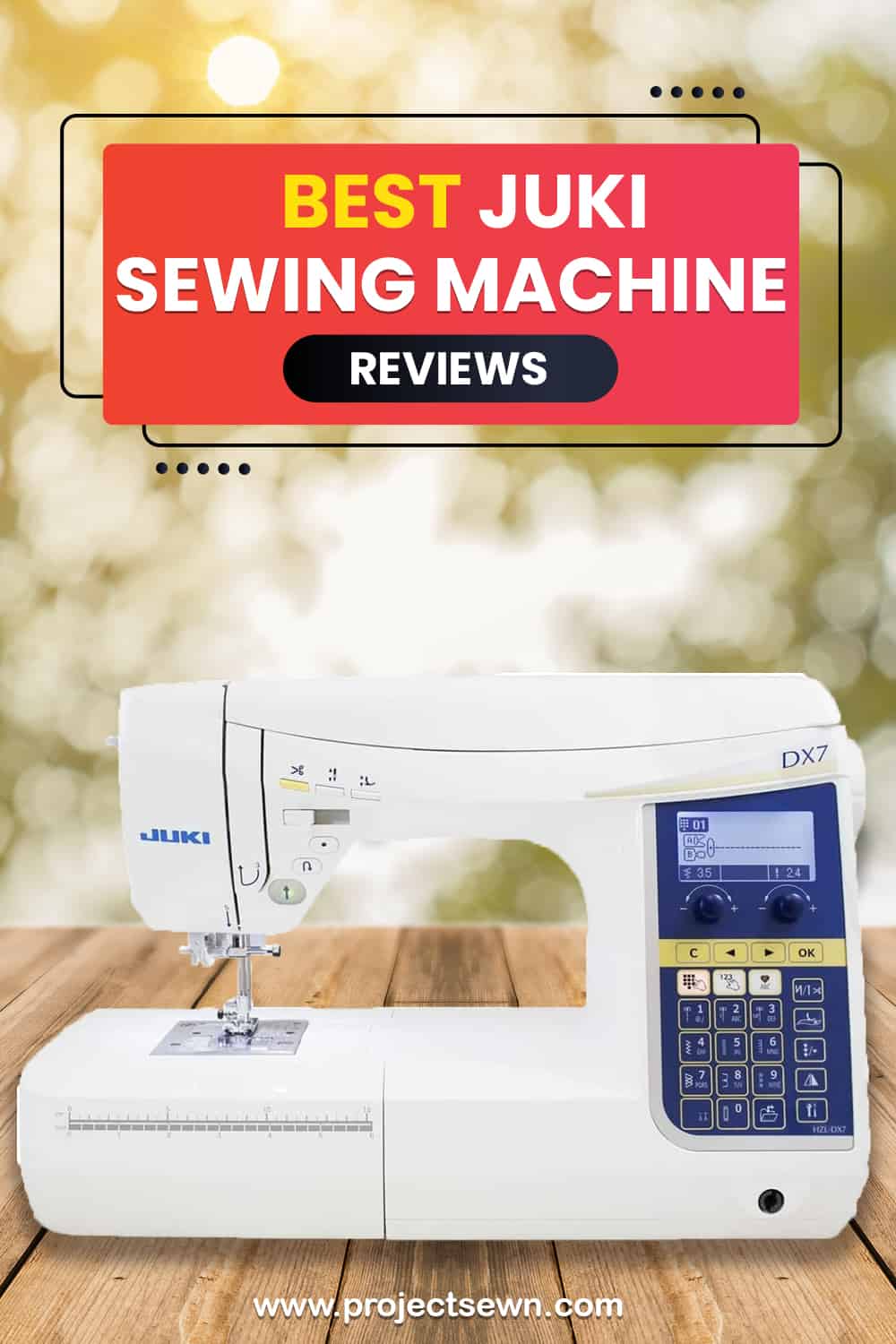
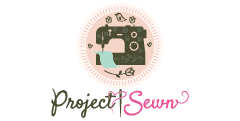
What do you think of the JUKI HZL-UX8 and it’s price?
Dear Hannah,
Thanks for reaching out.
Unfortunately, I haven’t used this sewing machine yet. I also couldn’t find anything on this model on the internet except for YouTube tutorials. Is it an older model?
Have a lovely day and stay safe.
Love, Sara.